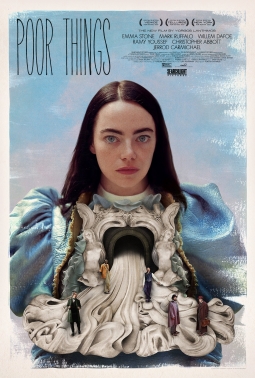
In a way, director Yorgos Lanthimos is a more eccentric version of Tim Burton, which speaks volumes since Burton is notorious for glamorizing the strange, the ugly and the offbeat. Yet, unlike Burton, Lanthimos is a cynic at heart — whether he is adopting a social-dystopian lens with “The Lobster” (2015) or an anti-authoritarian view with “Dogtooth” (2009). With “Poor Things” (2023), the director finally embraces the sincere quirkiness of the protagonist with open arms, allowing me — someone who never clicked with Lanthimos’ work — to fully understand his appeal.
Adapted from Alasdair Gray’s 1992 novel, “Poor Things” follows a Frankenstein-inspired Bella Baxter, played by Emma Stone, who is revitalized after committing suicide by surgeon Dr. Godwin Baxter, played by Willem Dafoe. During the operation, Dr. Baxter replaces the pregnant Bella’s brain with her baby’s to save her life. Throughout its audacious 141-minute runtime, the audience watches Bella’s rapid development unfold as she makes peace with her identity through sexual liberation and numerous complicated encounters with men, including Mark Ruffalo’s career-defining performance as Duncan Wedderburn, Ramy Youssef’s Max McCandles — Dr. Baxter’s assistant who becomes a romantic interest of Bella — and Jerrod Carmichael’s Harry Astley.
A story as conceptually daunting as “Poor Things” demands a lot from Stone. She not only needs to depict the psychological and psychosexual development of a lab-created human, but she must also portray immense emotional pathos and near-constant comedy. Anything other than a tour de force lead performance would’ve resulted in a story too weird and alienating for even the more seasoned audience members.
To my delight, Stone is an absolute wonder playing Bella. Within the first hour, Stone displays an enthralling sense of child-like wonder — with her large, wide eyes, the way she enunciates and uses certain words, her stiff, uneven movements and her constant curiosity of the world conflicting with Dr. Baxter’s possessive parenting style. This desire for autonomy eventually leads her to the hedonistic, perverse Duncan, which is when the film’s feminist subtext takes center stage.
Since its premiere at last year’s Venice International Film Festival, many have understandably compared “Poor Things” and its examination of the female identity to Greta Gerwig and Noah Baumbach’s “Barbie” (2023); some would go as far as to say “Poor Things” is “Barbie” for the “art-house” crowd. While the comparison isn’t too far-fetched, I would argue that Lanthimos’ portrayal of Duncan is more unhinged in its critique of the patriarchy than anything present in Gerwig and Baumbach’s screenplay. Not to mention, “Poor Things” explores paternity through Dr. Baxter, creating an underlying discussion of the “yin-yang” gendered power dynamics theory that adds another layer to its exploration of feminism.
Additionally, to say these two films are merely pieces of feminist media is a massive disservice to both. “Barbie” subverts and satirizes its intellectual property, using it as a vehicle to examine itself and our consumerist world, whereas “Poor Things” celebrates human life and growth — a refreshing change of pace for Lanthimos.
This isn’t to imply that the director has completely abandoned his established identity as a storyteller — sex remains the foundation of his work. Nonetheless, most of what he’s doing in “Poor Things” is uncharted territory. If you’ve watched his previous work, “The Killing of a Sacred Deer” (2017) or “Dogtooth,” realism exists in those worlds despite the dystopian backdrops. “Poor Things” ditches this concept, adopting a steampunk-inspired science fiction illustrated by retro-futuristic technology and aesthetics, lavish set designs and lens choices that are anything but ordinary.
Even the comedic style deviates from the typical Lanthimos approach. While “Dogtooth” finds humor in the uncomfortable — think “Nathan Fielder” but somehow weirder — “Poor Things” employs comedy to mock its detestable characters.
To use Duncan’s character as an example, a younger Lanthimos might have taken the deplorable ethics of “furious jumping” with a mentally underaged Bella and pushed it to the forefront. This perspective would’ve provoked constant dread; you’d probably feel guilty for laughing at its absurdity. However, in “Poor Things,” the playful tone establishes Duncan as a reprehensible caricature of patriarchal men. This culminates in a more pronounced condemnation when Duncan’s possessive behavior falls flat as Bella’s curiosity of the world can’t be controlled; she’s her own being, and that should be embraced.
Ultimately, seeing Bella self–actualize makes “Poor Things” the first Lanthimos film I find immensely gratifying. By the movie’s second half, each person she meets sheds light on a new aspect of humanity. Bella grapples with the complexities of socioeconomic inequality, enlightenment and philosophical pessimism, only to reject cynicism and the rules assigned to her with the emphasis on the absurdity of “rules” feeling very Lanthimos-esque.
By the end, loose ends are neatly tied up. Bella reflects the societal troubles around her like a mirror. When she witnesses and acknowledges these issues, she’s proactive and wants to create change. She doesn’t always succeed in her endeavors, and she’s not a perfect human, but that’s what makes her ferociously captivating.
“Poor Things” lives up to its instant classic status, and I wouldn’t be surprised if the movie picks up several wins in the upcoming 96th Academy Awards.


















